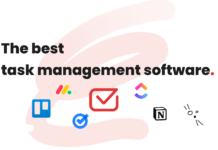
If a company has survived this year, it is because they are doing “remote work” right. Let us be honest – COVID-19 has changed the operational dynamics of every business. Those companies that view remote working as a temporary solution and do not deploy proper processes, struggle to grow. Not-so-surprisingly, their employees are unhappy and frustrated.
But the remote landscape looks more positive. According to an Intermedia survey, 77% of remote workers said they are likely to increase remote working options for their employees in the long term. That is a smart move, as 77% of remote workers feel more productive when working from home—as studies report.
Despite the positives, the sudden shift to remote working has not been easy. Companies have had to put processes in place that help their employees work more efficiently and bring them together even when apart.
Of course, engaging them with several tools enables them to work cooperatively while achieving shared goals. But if you want to keep things simple and have them work on one tool, then deploying a CRM across functions can help tremendously in such a scenario.
Here are eight ways in which they can help your remote team perform efficiently:
1. Centralizes work and minimizes data fragmentation
Even though your remote team does not have a physical office to go to, they still need a centralized hub of business data and project details that can be accessed from anywhere. That is because the information that was already scattered across marketing systems, spreadsheets, and emails became less accessible than before in a distributed working model.
When data is fragmented, your remote team will not get a complete view of customers or the tasks they are supposed to. Sure, some companies might use two different software for storing project data and customer information. But essential details and potential selling opportunities could go unnoticed due to data fragmentation and systems overlap.
Your remote team must be adequately equipped with all the information they need to do their job efficiently. That is why implementing an all-in-one CRM system, which combines and links project and customer data together, is necessary.
Sales teams, for instance, are quick to act when they have a unified view of data in real-time. They can track pipeline reports, regional sales performance, activity breakdowns, monthly KPIs, and everything else on a single system.
A CRM solution ensures operational alignment when the remote sales team knows what each member is doing, where they are at with a specific customer, and the monthly KPIs that have to meet. That way, your team can continue performing well as just they would in an office setting.
2. Sets standard definitions and processes
A remote work setting often leaves room for misinterpretations. Since your remote team does not meet face-to-face every day, issues can escalate exponentially if they are not dealt with immediately. One reason for the confusion is the lack of clarity in basic terminology or procedures among remote workers. That could include:
- Clear KPIs and accountability
- Expectations on equipment devices
- Protocols during breach
- HR support and policies
Your team might have access to clean, updated data in real-time. But if they disagree with standard definitions, data will be messy, leading to inefficiency. Your remote team cannot afford to be lost and helpful when they are already bogged down with potential distractions at home.
Depending on the CRM system, you can cover a lot of ground—from payroll to HR—along with team-specific responsibilities. With proper processes in place, your remote team world can utilize the system as intended and that too, efficiently!
3. Encourages real-time collaboration and maintains transparency
It is obvious—the better remote teams can communicate and share data, the more efficiently they can work and meet their KPIs. Seamless collaboration is essential to any team’s speed and efficiency. A CRM system can ensure that.
It can make it easy for your team to collaborate on growth opportunities and campaigns and enable sharing insights, proposing new ideas, and quickly finding the latest resources and presentations.
A CRM system can also ensure the remote team collaborates in real-time on specific spreadsheets, potential customers and employees, and documents under a single roof.
For instance, for sales teams, it is necessary to engage with customers regularly to deliver pitches, nurture leads, and close deals. Remote finance teams can share presentations, bills of materials, and calculations with stakeholders to know what is happening in the company from a financial perspective.
HR teams can also use a CRM system for their hiring process by assigning scores to candidates based on their expertise to reduce bias. This reduces their effort and time for hiring a new employee and ensures they do not make a bad hire for the company.
4. Ensures customer issues are addressed promptly
A CRM system is a boon to customer service teams. After all – they have to be on the job 24/7 and cannot afford to miss a single customer complaint. Whether you have a distributed customer service team or one that is geographically located in one place – a CRM system can help them significantly improve customer experience in real-time in many ways.
You can quickly respond to queries and complaints online. Customers do not have all day to wait for your remote customer service team to respond to them. In fact, the faster your response, the better it is. Plus, customers can contact the business on any platform – social, email, live chat, call center.
Therefore, your team must set up automated email templates on the CRM system and have call scripts and social media responses ready by their side. Plus, the communication going out from your company has to match the brand’s tone of voice.
Additionally, a CRM system comprises a range of information about your customers, including past activities, browsing histories, and purchases. This data will help your remote team provide practical solutions to distressed customers and update them with custom company news, sales campaigns, and offers.
In a nutshell, a CRM system can help segment the customers and address the right audience with targeted messaging promptly and efficiently.
5. Integrates with external apps for improved functionality
Purchasing a CRM system is a challenging task. You have to anticipate you are going to need more features as the company grows with time. But like every business, you have to start small and buy a CRM system within your budget that can get set up and running at the earliest.
Today, you might need extra pairs of hands for your remote team to work efficiently. Thankfully, most CRM systems can integrate with third-party apps.
For instance, you can integrate a few productivity apps, such as Trello, to reduce the hassle of juggling different software and losing track of tasks and deadlines. Or integrate scheduling or calendar apps with your CRM.
If your remote team needs more robust accounting support—one that enables them to include invoicing, expense claims, sales quotas, and more—check if the CRM system can be integrated with Quickbooks or Xero apps.
Bringing all relevant business apps together is the secret sauce for your remote team’s increased efficiency and creative focus. Automate the busy work, add layers of contextual detail in the processes and meet a goal from different angles by connecting your CRM system with vital external app integrations.
6. Offers mobile CRM access
Long gone are the days when remote workers would only access the CRM system from their desktops or laptops. Today, 81% of users access it from multiple devices, including tablets and mobile. According to a Forrester study, 50% of employees saw a rise in their productivity by using mobile CRM, and that is not it.
Mobile CRM users also achieve higher results in adopting the platform. As per a Nucleus Research report, 65% of sales teams achieved their KPIs, as compared to 22% of them that used a non-mobile CRM.
There is no denying that the mobile CRM empowers remote teams to communicate better amongst themselves, with customers, vendors, and stakeholders, efficiently manage tasks, and stay updated with everything in the company.
Plus, your remote team can access the CRM anywhere and at any time—whether they are in the kitchen, at the supermarket, or on a break. It enables them to stay on top of things and even take action or respond in emergency times.
They do not have to wait until they are in front of their laptop or desktop to check their emails. There is no gap in the workflows.
7. Delivers actionable insights for creating better strategies
It is essential to be flexible in decision-making and amend strategies to adapt to the evolving market conditions at a time of crisis. Thanks to the CRM software, the data gets automatically updated, which further helps remote teams remove the guesswork out of forecasting for any business division.
They can analyze customer interaction levels, understand how customers think, and anticipate their behavior—all of which will help your business sell smart and engage in relevant conversations with the target audience.
Depending on the CRM system, your remote team can accordingly analyze the figures to arrive at actionable insights and use its robust reporting and interactive dashboards. Hence, they can leverage the predictive analytical capabilities of the CRM, anytime and anywhere.
Moreover, to optimize growth, leads need up-to-date information on many performance-related elements across points of sales, channels, product or service categories, marketing campaigns, and so on. Such data helps businesses better prioritize team resources and activities.
8. Automates repetitive tasks
The insights captured and stored in the CRM are crucial to building a 36-degree view of the customers. By providing your remote team with the solutions needed to establish and foster customer relationships in a fast-paced market, they can lead from the front to turn those insights into intelligence, enhance their service delivery, and boost business growth.
But they can only do so when they are mentally free from doing menial tasks such as sending follow-up emails or booking an appointment. Such tasks are not only time-consuming but also take up much energy of the employees.
If you want your remote team to work smartly, they have to automate repetitive tasks that bog them down on a daily basis. By eliminating the rut work, they can focus on high-end, advisory jobs that directly boost the business’s bottom line.
From appointment scheduling, email follow-ups, and report generation to email writing, lead scoring, and leaving voicemails—all these activities and more can be automated—irrespective of the function in which your remote team works.
In conclusion
Remote workforces are here to stay even beyond the pandemic. Employees will continue working from multiple locations, whether they are at home or on-the-fly. Given they are more productive and happy working that way, companies should provide a platform that helps their employees be efficient and successful from wherever they work.








